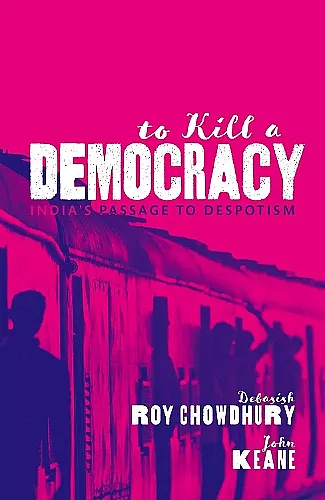To Kill A Democracy
India's Passage to Despotism
John Keane author Debasish Roy Chowdhury author
Format:Hardback
Publisher:Oxford University Press
Published:24th Jun '21
Should be back in stock very soon

India is heralded as the world's largest democracy. Yet, there is now growing alarm about its democratic health. To Kill a Democracy gets to the heart of the matter. Combining poignant life stories with sharp scholarly insight, it rejects the belief that India was once a beacon of democracy but is now being ruined by the destructive forces of Modi-style populism. The book details the much deeper historical roots of the present-day assaults on civil liberties and democratic institutions. Democracy, the authors also argue, is much more than elections and the separation of powers. It is a whole way of life lived in dignity, and that is why they pay special attention to the decaying social foundations of Indian democracy. In compelling fashion, the book describes daily struggles for survival and explains how lived social injustices and unfreedoms rob Indian elections of their meaning, while at the same time feeding the decadence and iron-fisted rule of its governing institutions. Much more than a book about India, To Kill A Democracy argues that what is happening in the country is globally important, and not just because every third person living in a democracy is an Indian. It shows that when democracies rack and ruin their social foundations, they don't just kill off the spirit and substance of democracy. They lay the foundations for despotism.
The authors plunge into India's postindependence public-policy inadequacies with unsparing accounts laden with telling anecdotes and a host of pertinent statistics. * %Sumit Ganguly, Journal of Democracy *
A searing and original polemic. * James Crabtree, Financial Times *
A richly sourced and fast-paced directory of the unevenly distributed life chances of ordinary Indians. * Sonia Faleiro, Times Literary Supplement *
An urgent survey of India's democratic shortcomings... The book is a happy marriage of the authors' skills and expertise. A thoroughgoing, finely grained awareness of Indian politics and society is blended with a rigorous understanding of how democracy works and what is needed for it to thrive. The book avoids academic jargon, with the result that it is clear, accessible and compelling... it will be a fascinating read for anyone who cares about the fate of the world's biggest democracy. * Abhinmanyu Arni, Literary Review *
A fiercely urgent book, expansively researched and reported. * Liesl Schwabe, Los Angeles Review of Books *
Well-researched. * Mihir Bose, Irish Times *
The evidence of India's democratic slide that Roy Chowdhury and Keane amassed impresses with its sheer scope and detail. .. their findings highlight the myriad flaws that now pockmark the country's political system. * Sumit Ganguly, Journal of Democracy *
In vivid and compelling terms, [Chowdhury and Keane] detail [India's] various 'social emergencies'... They sketch equally distressing pictures of its politics, not least the malign influence of money, the ubiquity of violence, the unravelling of law and order, and the near disappearance of accountability. * Ian Hall, Australian Book Review *
Debasish Roy Chowdhury and John Keane refreshingly use history, marshal facts and weave a complex and compelling narrative on why India's democracy stands at a dangerous crossroad... [an] important and well-written book. * Seema Chishti, The Hindu *
In marrying academic theories of democracy with eyewitness experiences, Chowdhury and Keane make a compelling argument for judging a democracy from a human-centric position and measuring its success on the resilience and nurturing of its social foundations. * Amrit Swali, The World Today *
An important new book analyzes the deep-seated forces behind the long decline of the 'world's largest democracy'... Few will find nothing new to learn from this book. Practically every aspect of life in India, and not just elections or the other bare bones of democracy, is covered in detail. * David Simmons, Asia Times *
In a hard-hitting, relentless chronicle of social and political ills, Chowdhury and Keane trace the decomposition of Indian democracy since the hopeful time of independence in August 1947... This book sounds an urgent alarm. * Kirkus *
A must-read for anyone who wants to understand the challenges facing democracy in the modern world. * Matthew Taylor, Chief Executive, The Royal Society of Arts *
Debasish Chowdhury and John Keane's nuanced portrayal of Indian democracy offers a sobering account of the ways in which inequality manifests itself in a democracy with tremendous potential and immense shortcomings. This book contains important observations for those who care about the future of India particularly in the realm of education reform, labour reform and electoral politics. We are living at a moment in time when illiberal democracies are successfully consolidating their power, creating a condition which the authors describe as elective despotism. While India is their focus, a reader in the United States, Europe or even Malaysia will find much to contemplate in his or her own national consideration of the pursuit of justice and fairness. * Anwar Ibrahim, President, People's Justice Party, Malaysia *
As democratic malaise gathers strength the world over, To Kill a Democracy spotlights the gradual erosion of norms and institutions in the world's largest democracy, India. At once quick-paced and sober, this book addresses a key puzzle about modern politics: why do poor citizens in a poor democracy continue to be left behind? * Milan Vaishnav, Director and Senior Fellow, South Asia Program, Carnegie Endowment for International Peace *
ISBN: 9780198848608
Dimensions: 240mm x 162mm x 30mm
Weight: 586g
336 pages